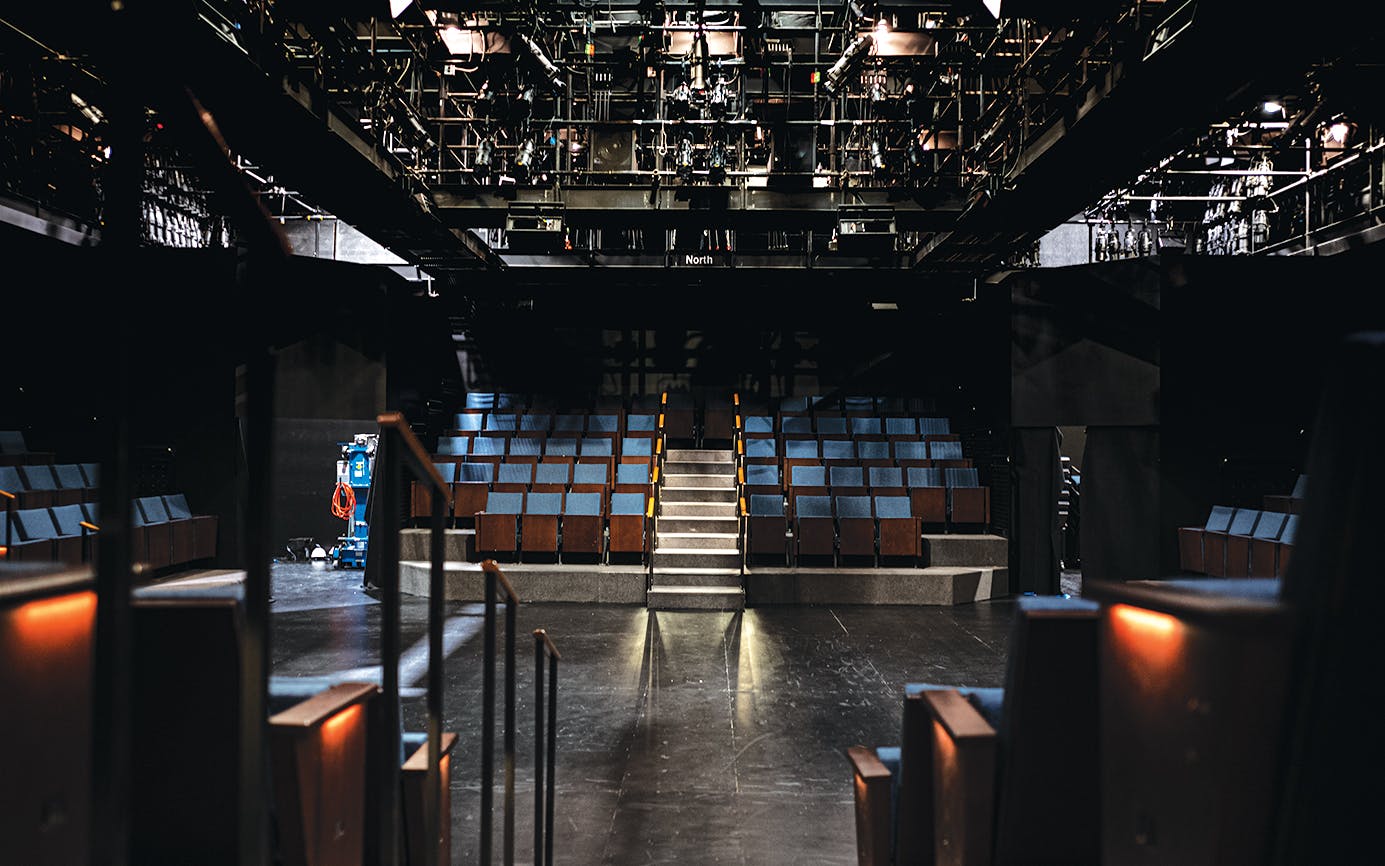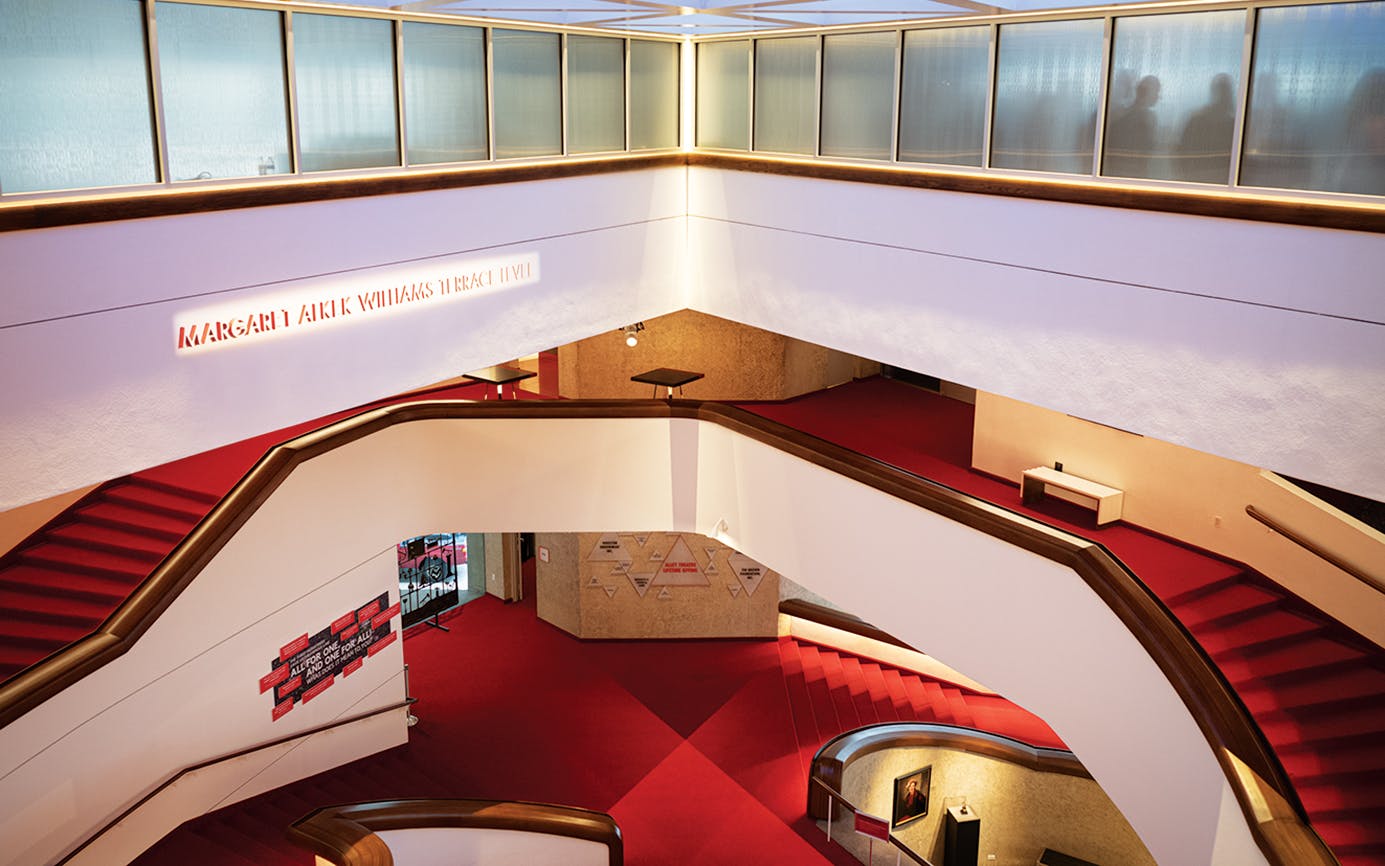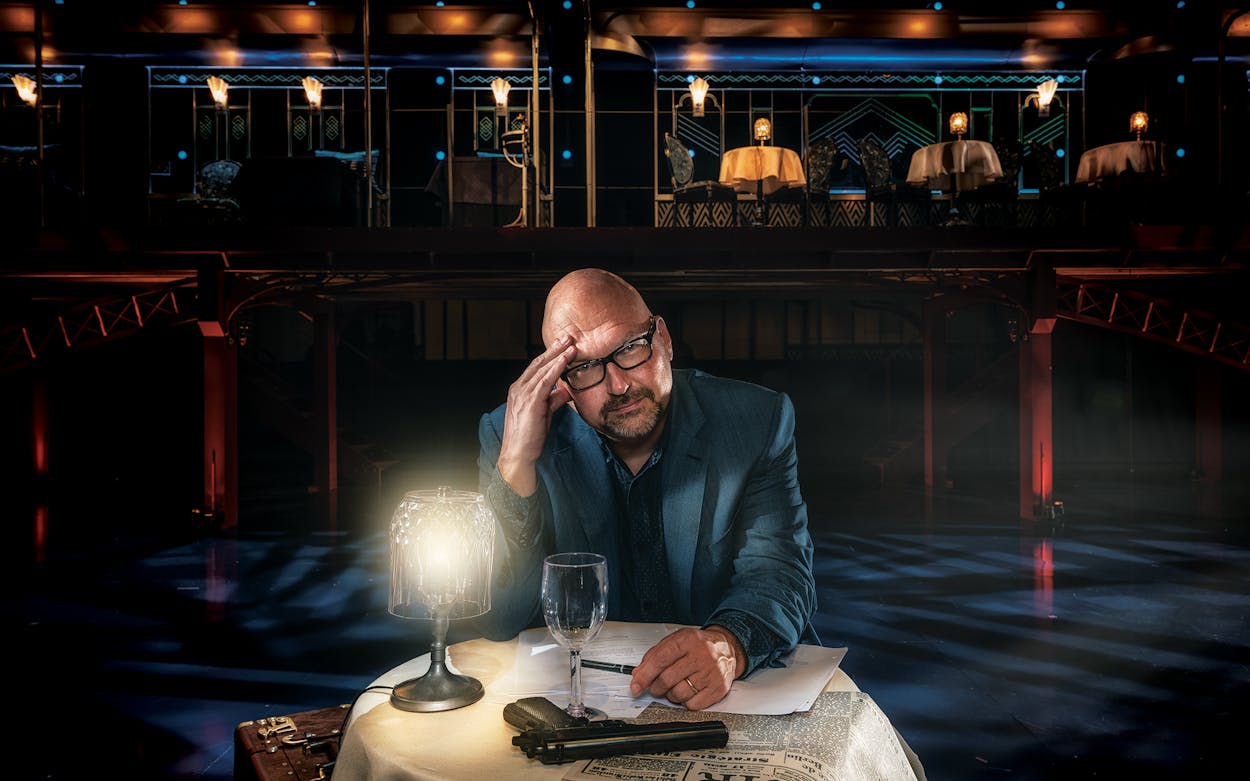Since his introduction last November as the new artistic director of Houston’s Alley Theatre, Rob Melrose has done, by his own count, perhaps a hundred media interviews, videos, and public appearances with groups eager to meet the new de facto leader of the region’s theater scene. Not once, he insists, did he ever declare that he would shift the aesthetic values of the Alley—the Tony Award–winning downtown institution—toward experimental theater.
At the same time, the 49-year-old Melrose brings to Texas a certain pedigree from his time as the cofounder of San Francisco’s notoriously edgy Cutting Ball Theater company, where he earned a reputation as a translator of boundary-pushing works by twentieth-century European playwrights like Alfred Jarry and Eugène Ionesco. Melrose, a tireless polyglot, has translated plays from French, German, Swedish, and Italian; he first discovered his passion for a career in theater by translating and directing Jean-Paul Sartre’s No Exit at age eighteen, before heading off from suburban Minneapolis to Princeton and, eventually, the Yale School of Drama. Somewhat understandably, word seems to have spread in Houston, a city not always known as a hotbed for the avant-garde, that Melrose’s hiring means an overhaul in style for the Alley.
“I got an angry letter from a subscriber saying, ‘Why are you going to bring absurdism to Houston? If I wanted absurdism, I just have to read the paper,’ ” Melrose says, swirling his iced tea in the lobby of the Lancaster Hotel, across the street from the Alley. “It’s not about a revolution. I don’t want anybody to feel like, ‘Wait a minute, what did you do to my theater?’ ”
From this white-tablecloth vantage point, Melrose describes the low-overhead Cutting Ball, which he cofounded in 1999 with his wife, Paige Rogers, as a “niche theater” with a stated mission to go beyond naturalism and conventionalism and offer bold, unique flavors. At a major regional institution like the Alley, however, Melrose says he recognizes his responsibility to operate “more like the Museum of Fine Arts, Houston,” with Van Gogh in one room and antiquities in the next. For the Alley, this means maintaining traditions like the yearly production of A Christmas Carol, keeping one foot in Shakespeare and other classics, fostering a diverse resident acting company in plays that speak to a wide range of experiences, and, yes, making an occasional splash with something more challenging.

Along those lines, Melrose’s first directing credit for the Alley, which debuted in July and runs through August 25, is a wholly traditional summer-season production of Agatha Christie’s Murder on the Orient Express. His second credit—and the first play of the first season he’s programmed at the Alley, which debuts in September—will be a modern version of Shakespeare’s The Winter’s Tale. Not until March 2020 will things begin to get a bit more provocative, when Melrose directs a new adaptation of George Orwell’s 1984.
All this is not to say that Melrose doesn’t have big changes in store for the Alley, or that important constituencies haven’t been crying out for a new leadership approach. It’s just that the most pressing problems at the Alley have nothing to do with its programming.
The year leading up to Melrose’s hiring was as challenging as any in the Alley’s 72-year history. First, in late August 2017, the floodwaters of Hurricane Harvey swept into the Alley’s basement level, devastating costume and prop storage—over 80,000 props were lost, many dating back decades—and inundating the Alley’s 310-seat secondary stage, the Neuhaus (its main stage, the 774-seat Hubbard, was relatively unscathed). Damage totaled $22 million. The theater had to rely on fund-raising for the bulk of the money; it just finished paying off an emergency loan and is still working with the Federal Emergency Management Agency to cover some of the repairs.

WILLIAM GOES WEST
Classic Shakespeare is reimagined in contemporary Texas in the Alley’s version of The Winter’s Tale, which kicks off the theater’s new season September 13.
The Neuhaus was gutted, sanitized, and reopened by January 2018, but that same month brought distressing news. Gregory Boyd, the company’s artistic director for 28 years and in many ways the don of the Houston theater world, became the subject of #MeToo-era headlines that seemed to hasten his retirement. An investigation by the Houston Chronicle found more than a dozen current and former Alley employees accusing Boyd of fostering a hostile and abusive work environment, especially for young actresses; engaging in inappropriate touching; and introducing arbitrary female nudity into productions with the stated logic “It’s the only way people will pay attention.”
Boyd resigned abruptly, days before the publication of the Chronicle story, which also included an allegation that “someone” within the institution was protecting him. Contacted for this story, Alley higher-ups declined to comment on Boyd. Via email, communications manager Whitney Spencer noted, “We weathered both an external storm (Hurricane Harvey) and an internal storm (departure of the previous director) in 2018, and the staff as a whole is now looking forward.”
Melrose, who has never met Boyd, is in the position of having to both defend his colleagues from collateral criticism and clarify that he will make necessary changes to the Alley’s creative protocols. He characterizes Alley staff and resident actors as victims of a “person who was challenging,” who feel further victimized when the theater comes under attack. At the same time, Melrose has embraced the opportunity to make cultural changes at the Alley. For starters, Boyd’s closed rehearsals are gone; Alley staff, board members, and students from invited university programs are now welcome to watch rehearsals. “Sunlight is the best disinfectant,” Melrose says.
Along similar lines, Melrose is also adopting a set of anti-harassment and -discrimination guidelines developed by other national theaters in the crucible of the #MeToo movement, which include inviting “intimacy consultants” to help with hot-and-heavy scenes. “When you’re doing a fight, the director doesn’t hand one actor a baseball bat and another actor a crowbar and say, ‘Hey, why don’t you guys go at it, and I’ll tell you what I like,’ ” Melrose says, arguing that similar care should be taken with intimate scenes.

Melrose also has his eye on renewing the Alley’s commitment to serving Houston’s diverse communities. Among the plays included in his first season as artistic director are Vietgone (opening October 4), a comedy about post–Vietnam War immigrants to the U.S. by playwright Qui Nguyen, who has family ties to Houston, and Quixote Nuevo (January 17), a reimagining of the Don Quixote story set on the contemporary U.S.-Mexico border by El Paso–born playwright Octavio Solis. Solis, based in San Francisco and recently featured as a voice actor and cultural consultant on Pixar’s Coco, has known Melrose for years and speaks optimistically of what his hiring at the Alley might signal for Houston theater. “I think it means there’s a new era that’s going to bring some greater diversity in play selection and in the company makeup and staff makeup,” Solis says.
Melrose, for his part, hopes that Quixote Nuevo can do for the Alley what his staging of Suzan-Lori Parks’s The Death of the Last Black Man in the Whole Entire World did for Cutting Ball in 2006. Before that production, Cutting Ball had been casting out of the predominantly white pool of actors who showed up to auditions, resulting in what Melrose refers to disappointedly as “white avant-garde theater.” When he decided to put up a regional debut of Parks’s play, which features eleven roles for black actors, some colleagues doubted he could cast it convincingly. But Melrose gave himself a year to recruit and build bridges with the black theater community in the Bay Area, and the result was one of Cutting Ball’s best-loved productions. The relationships forged through that process also helped permanently diversify the company in its future castings.
Institutional change takes time, but there’s no question Melrose brings a different energy to the Alley from that of its previous artistic director. He credits his personal ethos to something he picked up from his high school drama teacher, who was Melrose’s best man at his wedding to Rogers. “I associate theater with kindness, and seeing the best in people, and bringing the best out of people,” he says. “For me, theater’s synonymous with that—and collaboration.”
This article originally appeared in the September 2019 issue of Texas Monthly with the headline “At the Alley, a Breath of Fresh Air.” Subscribe today.







